|
The Internet is a powerful resource. It provides us instant
access to information, and brings us together via email,
bulletin boards, chat rooms, and instant messaging. FAOL
is a wonderful example of the Internet at its best. The Internet,
however, will never replace the printed page.
I've loved books and fishing since my youngest years, although
I did not start fly fishing until 1993. This column will give
me an opportunity to share reviews of some of my favorite fly
fishing and tying books (and some that are not such favorites)
with my friends here at FAOL. My library reflects my tastes
and interests, and so will this column. It will be heavily
slanted towards cold water fishing and tying for trout and
steelhead, and won't touch much on areas of which I know little,
such as warm or salt water fishing.
I hope that these reviews will motivate some of you to pick up
a good book, on this or any subject, and read.
~ Stu Farnham
Trout from Small Streams
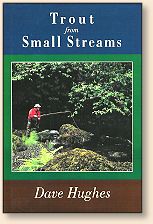 Trout from Small Streams
Trout from Small Streams
By Dave Hughes
Hardcover: 167 pages
Publisher: Stackpole Books;(January 2003)
ISBN: 0811700313
I think I've mentioned once or twice that Dave
Hughes is a favorite author of mine. To be honest,
I've been disappointed with Dave's last few books,
as they were either updates to classics (Western
Streamside Guide), condensed versions of prior
books (Essential Trout Flies), or simply
not up to the standard I'd come to expect from Hughes
over the years (Matching Mayflies). Happily,
Trout from Small Streams marks Dave's return
to top form. In this book Dave writes on a topic which is
clearly special to him, in his usual direct and almost
conversational style.
Trout from Small Streams is not a book filled
with breakthrough techniques and innovative thinking. Instead,
it is a book about specialization, about the nuances and
variations involved in fishing small water.
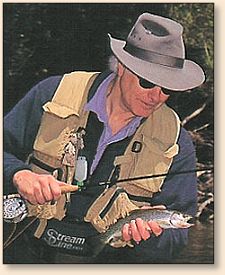 Hughes grew up on the coast of my adopted home state of
Oregon, and, as a boy, fished the small streams that
plunge from the West slopes of Oregon's coast range
into the bays and estuaries of the Pacific coast. These
are not the destination streams we read about in fly
fishing magazines, and they do not hold trophy trout.
This does not mean they are without a powerful attraction,
as they offer intimacy, isolation, and the opportunity
to fish for the native trout of the Pacific Northwest
in their native streams. Even today a topographic map,
a sense of adventure, and a willingness to hike a few
miles from the road can lead you to such fishing.
Hughes grew up on the coast of my adopted home state of
Oregon, and, as a boy, fished the small streams that
plunge from the West slopes of Oregon's coast range
into the bays and estuaries of the Pacific coast. These
are not the destination streams we read about in fly
fishing magazines, and they do not hold trophy trout.
This does not mean they are without a powerful attraction,
as they offer intimacy, isolation, and the opportunity
to fish for the native trout of the Pacific Northwest
in their native streams. Even today a topographic map,
a sense of adventure, and a willingness to hike a few
miles from the road can lead you to such fishing.
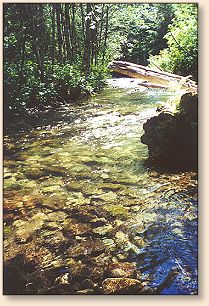
Small being a relative term, Hughes starts by defining
what he means when he speaks of a small stream. "A small stream,"
Dave says, "is a short cast across where the stream is at its widest."
Small streams come in the same variety of configurations
as larger rivers, shaped by the topography and geology of
the terrain through which they flow, and ranging from
plunging mountain brooks to meandering meadow creeks.
After describing how the streams he fished on as a boy
influenced how he fishes and the kind of fishing he
most enjoys, Hughes describes the small stream tackle
he's settled on over the years: a short, fast rod
(preferably but not necessarily bamboo), a canvas belt
pack, and a single box of flies chosen for their
versatility. Waders? Dave confesses to a preference
for felt-soled hippers.
Fishing small streams can present a number of technical
challenges. Space for a backcast is often limited.
Relatively shallow, clear water places extra demands
for stealth, and limits your choice of approach. Hughes
relates his findings in a chapter titled The Learning Curve.
While one can generally catch small stream fish using
the same techniques that work on bigger water, Hughes'
experience has taught him a set of presentations that
are adapted to increase success on small streams. There
are chapters on dry fly and streamer techniques. The
chapter on wet flies refers back to Hughes' class work
on that subject. Along with the chapter on fishing beaver
ponds, this was the high point of the book.
~ Stu Farnham
About Stu
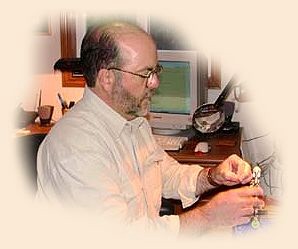 Stu Farnham is a New Englander by birth, who was transplanted to
and put down roots in Oregon in the early 1990s, now residing in
the Seattle area. A software engineering manager by vocation,
he can be found in his spare time chasing trout and steelhead
in the rivers of the Pacific Northwest, chasing his four Gordon
Setters (who in turn are chasing chukar), tying flies, reading,
or working on his website. Colleen, his long suffering wife of
28 years, is a professionally trained personal chef.
Stu Farnham is a New Englander by birth, who was transplanted to
and put down roots in Oregon in the early 1990s, now residing in
the Seattle area. A software engineering manager by vocation,
he can be found in his spare time chasing trout and steelhead
in the rivers of the Pacific Northwest, chasing his four Gordon
Setters (who in turn are chasing chukar), tying flies, reading,
or working on his website. Colleen, his long suffering wife of
28 years, is a professionally trained personal chef.
|
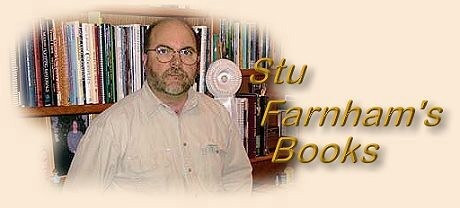
 Trout from Small Streams
Trout from Small Streams Stu Farnham is a New Englander by birth, who was transplanted to
and put down roots in Oregon in the early 1990s, now residing in
the Seattle area. A software engineering manager by vocation,
he can be found in his spare time chasing trout and steelhead
in the rivers of the Pacific Northwest, chasing his four Gordon
Setters (who in turn are chasing chukar), tying flies, reading,
or working on his website. Colleen, his long suffering wife of
28 years, is a professionally trained personal chef.
Stu Farnham is a New Englander by birth, who was transplanted to
and put down roots in Oregon in the early 1990s, now residing in
the Seattle area. A software engineering manager by vocation,
he can be found in his spare time chasing trout and steelhead
in the rivers of the Pacific Northwest, chasing his four Gordon
Setters (who in turn are chasing chukar), tying flies, reading,
or working on his website. Colleen, his long suffering wife of
28 years, is a professionally trained personal chef.
 Hughes grew up on the coast of my adopted home state of
Oregon, and, as a boy, fished the small streams that
plunge from the West slopes of Oregon's coast range
into the bays and estuaries of the Pacific coast. These
are not the destination streams we read about in fly
fishing magazines, and they do not hold trophy trout.
This does not mean they are without a powerful attraction,
as they offer intimacy, isolation, and the opportunity
to fish for the native trout of the Pacific Northwest
in their native streams. Even today a topographic map,
a sense of adventure, and a willingness to hike a few
miles from the road can lead you to such fishing.
Hughes grew up on the coast of my adopted home state of
Oregon, and, as a boy, fished the small streams that
plunge from the West slopes of Oregon's coast range
into the bays and estuaries of the Pacific coast. These
are not the destination streams we read about in fly
fishing magazines, and they do not hold trophy trout.
This does not mean they are without a powerful attraction,
as they offer intimacy, isolation, and the opportunity
to fish for the native trout of the Pacific Northwest
in their native streams. Even today a topographic map,
a sense of adventure, and a willingness to hike a few
miles from the road can lead you to such fishing.